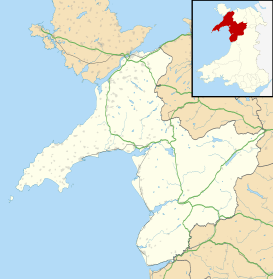Frongoch
| Frongoch | |
|---|---|
 The former Frongoch railway station | |
 Frongoch Frongoch shown within Gwynedd | |
| OS grid reference | SH905392 |
| Community | |
| Principal area | |
| Ceremonial county | |
| Country | Wales |
| Sovereign state | United Kingdom |
| Post town | BALA |
| Postcode district | LL23 |
| Dialling code | 01678 |
| Police | North Wales |
| Fire | North Wales |
| Ambulance | Welsh |
| EU Parliament | Wales |
| UK Parliament | |
| Welsh Assembly | |
The village of Fron-goch is located in Gwynedd, Wales. It lies close to the market town of Bala, on the A4212 road in north Wales.
By the late 1800s, Fron-goch was the main centre for whisky production in Wales. The distillery was bought by Scottish whisky companies and closed in 1910 when they were attempting to establish brands in England.[1][2]
It was the home of the Frongoch internment camp, used to hold German prisoners-of-war during First World War, and then Irish Republican prisoners from the 1916 Rising.
Railway station
Fron-goch railway station was on the Bala Ffestiniog Line. It closed to passenger services on 2 January 1960 and freight services on 27 January 1961. The station building and signal box are now in use as a private residence. It was converted to a holiday home during the early 1970s. The main station had a small extension added to the end to house a bathroom and the large warehouse was demolished to make way for several homes.
Cwmtirmynach Chapel

The Welsh Calvinistic Methodist chapel at Cwmtirmynach, lies on the B4501, 1.3 miles (2.1 km) north of Fron-goch. It was built in 1826 and rebuilt in 1880 in the Lombardic/Italian style of the gable-entry type.[3] The folk singer Robert Roberts (Bob Tai'r Felin) was precentor at the chapel for nearly 50 years.[4] There is weekly worship and the current minister is Hywel Edwards.[5]
Education
There is a Welsh-medium primary school, Ysgol Bro Tryweryn, in the village. There were 58 pupils aged between 3 and 11 years on roll in 2017.[6] As of January 2018, the school had the highest percentage of pupils (aged 5 and over) who spoke Welsh fluently at home in Wales, at 97.4%.[7]
References
- ↑ Freeman, Bobby (1996). First catch your peacock : her classic guide to Welsh food (Rev. paperback ed.). Talybont, Ceredigion: Y Lolfa. ISBN 0-86243-315-0.
- ↑ Davies, John; Jenkins, Nigel (2008). The Welsh Academy Encyclopaedia of Wales. Cardiff: University of Wales Press. ISBN 978-0-7083-1953-6.
- ↑ "Coflein". Coflein. Retrieved 19 April 2016.
- ↑ "The National Library of Wales :: Dictionary of Welsh Biography". Yba.llgc.org.uk. Retrieved 19 April 2016.
- ↑ "The Presbyterian Church of Wales - Cwmtirmynach". Ebcpcw.cymru. Retrieved 19 April 2016.
- ↑ "Ysgol Bro Tryweryn". mylocalschool.wales.gov.uk. Retrieved 2018-09-03.
- ↑ "Children speaking Welsh at home". gov.wales. Welsh Government. Retrieved 2018-08-31.
External links
| Wikimedia Commons has media related to Frongoch. |
